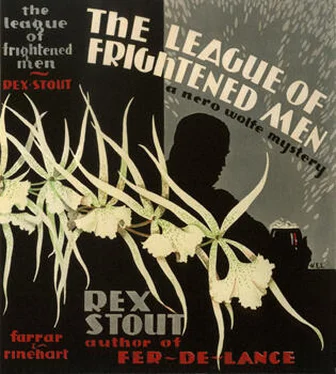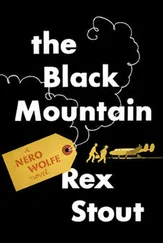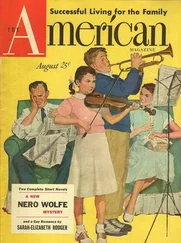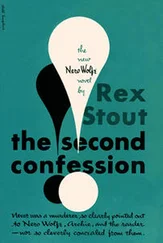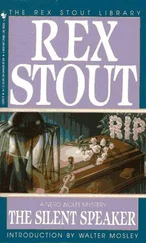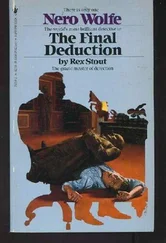Rex Stout - The League of Frightened Men
Здесь есть возможность читать онлайн «Rex Stout - The League of Frightened Men» весь текст электронной книги совершенно бесплатно (целиком полную версию без сокращений). В некоторых случаях можно слушать аудио, скачать через торрент в формате fb2 и присутствует краткое содержание. Год выпуска: 1935, Издательство: Farrar & Rinehart, Жанр: Детектив, на английском языке. Описание произведения, (предисловие) а так же отзывы посетителей доступны на портале библиотеки ЛибКат.
- Название:The League of Frightened Men
- Автор:
- Издательство:Farrar & Rinehart
- Жанр:
- Год:1935
- ISBN:нет данных
- Рейтинг книги:5 / 5. Голосов: 1
-
Избранное:Добавить в избранное
- Отзывы:
-
Ваша оценка:
- 100
- 1
- 2
- 3
- 4
- 5
The League of Frightened Men: краткое содержание, описание и аннотация
Предлагаем к чтению аннотацию, описание, краткое содержание или предисловие (зависит от того, что написал сам автор книги «The League of Frightened Men»). Если вы не нашли необходимую информацию о книге — напишите в комментариях, мы постараемся отыскать её.
The League of Frightened Men — читать онлайн бесплатно полную книгу (весь текст) целиком
Ниже представлен текст книги, разбитый по страницам. Система сохранения места последней прочитанной страницы, позволяет с удобством читать онлайн бесплатно книгу «The League of Frightened Men», без необходимости каждый раз заново искать на чём Вы остановились. Поставьте закладку, и сможете в любой момент перейти на страницу, на которой закончили чтение.
Интервал:
Закладка:
Wolfe interrupted me. “A moment. Go back a few sentences. Beginning that was difficult, for pawn — did you saw pawn ?”
I found it. “That’s it. Pawn. I don’t get it.”
“Neither did the stenographer. Proceed.”
At a certain point, some five years ago, I decided definitely he was psychopathic.
Wolfe: You continued to know him then?
Hibbard: Oh yes. Many of us did. Some of us saw him frequently; one or two associated with him closely. Around that time his latent brilliance seemed to find itself in maturity. He... well... he did things which aroused admiration and interest. Convinced as I was that he was psychopathic, I nevertheless felt less concern for him than I had for a long time, for he appeared to be genuinely involved in satisfactory — at least compensatory — achievement. The awakening came in a startling manner. There was a reunion — a gathering — of a group of us, and one of us was killed — died — obviously, we unanimously thought, by an accident. But he — that is, the man we had injured — was there; and a few days later each of us received through the mail a communication from him saying that he had killed one of us and that the rest would follow; that he had embarked on a ship of vengeance.
Wolfe: Indeed. Psychopathic must have begun to seem almost an euphemism.
Hibbard: Yes. But there was nothing we could do.
Wolfe: Since you were equipped with evidence, it might not have proven hazardous to inform the police.
Hibbard: We had no evidence.
Wolfe: The communication?
Hibbard: They were typewritten, unsigned, and were expressed in ambiguous terms which rendered them worthless for practical purposes such as evidence. He had even disguised his style, very cleverly; it was not his style at all. But it was plain enough to us. Each of us got one; not only those who had been present at the gathering, but all of us, all members of the league. Of course—
Wolfe: The league?
Hibbard: That was a slip. It doesn’t matter. Many years ago, when a few of us were together discussing this, one — maudlin, of course — suggested that we should call ourselves the League of Atonement. The phrase hung on, in a way. Latterly it was never heard except in jest. Now I fancy the jokes are ended. I was going to say, of course all of us do not live in New York, only about half. One got his warning, just the same, in San Francisco. In New York a few of us got together and discussed it. We made a sort of an investigation, and we saw — him, and had a talk with him. He denied sending the warnings. He seemed amused, in his dark soul, and unconcerned.
Wolfe: Dark soul is an odd phrase for a psychologist?
Hibbard: I read poetry week-ends.
Wolfe: Just so. And?
Hibbard: Nothing happened for some time. Three months. Then another of us was killed. Found dead. The police said suicide, and it seemed that all indications pointed in that direction. But two days later a second warning was mailed to each of us, with the same purport and obviously from the same source. It was worded with great cleverness, with brilliance.
Wolfe: This time, naturally, you went to the police.
Hibbard: Why naturally? We were still without evidence.
Wolfe: Only that you would. One or some of you would.
Hibbard: They did. I was against it, but they did go —
Wolfe: Why were you against it?
Hibbard: I felt it was useless. Also... well... I could not bring myself to join in a demand for retribution, his life perhaps, from the man we had injured... you understand...
Wolfe: Quite. First, the police could find no proof. Second, they might.
Hibbard: Very well. I was not engaged in an essay on logic. A man may debar nonsense from his library of reason, but not from the arena of his impulses.
Wolfe: Good. Neat. And the police?
Hibbard: They got nowhere. He made total asses of them. He described to me their questioning and his replies —
Wolfe: You still saw him?
Hibbard: Of course. We were friends. Oh yes. The police went into it, questioned him, questioned all of us, investigated all they could, and came out empty-handed. Some of them, some of the group, got private detectives. That was two weeks, twelve days ago. The detectives are having the same success as the police. I’m sure of it.
Wolfe: Indeed. What agency?
Hibbard: That is irrelevant. The point is that something happened. I could speak of apprehensions and precautions and so forth, I know plenty of words of that nature, I could even frame the situation in technical psychological terms, but the plain fact is that I’m too scared to go on. I want you to save me from death. I want to hire you to protect my life .
Wolfe: Yes. What happened?
Hibbard: Nothing. Nothing of any significance except to me. He came to me and said something, that’s all. It would be of no advantage to repeat it. My shameful admission is that I am at length completely frightened. I’m afraid to go to bed and I’m afraid to get up. I’m afraid to eat. I want whatever measure of security you can sell me. I am accustomed to the arrangement of words, and the necessity of talking intelligently to you has enforced a semblance of order and urbanity in a section of my brain, but around and beneath that order there is a veritable panic. After all my exploration, scientific and pseudo-scientific, of that extraordinary phenomenon, the human psyche, devil-possessed and heaven-soaring, I am all reduced to this single simple primitive concern: I am terribly afraid of being killed. The friend who suggested my coming here said that you possess a remarkable combination of talents and that you have only one weakness. She did not call it cupidity; I forget her phrasing. I am not a millionaire, but I have ample private means besides my salary, and I am in no state of mind for haggling.
Wolfe: I always need money. That is of course my affair. I will undertake to disembark this gentleman from his ship of vengeance, in advance of any injury to you, for the sum of ten thousand dollars.
Hibbard: Disembark him? You can’t. You don’t know him.
Wolfe: Nor does he know me. A meeting can be arranged.
Hibbard: I didn’t mean — hah. It would take more than a meeting. It would take more, I think, than all your talents. But that is beside the point I have failed to make myself clear. I would not pay ten thousand dollars, or any other sum, for you to bring this man to — justice? Ha! Call it justice. A word that reeks with maggots. Anyhow, I would not be a party to that, even in the face of death. I have not told you his name. I shall not. Already perhaps I have disclosed too much. I wish your services as a safeguard for myself not as an agency for his destruction.
Wolfe: If the one demands the other?
Hibbard: I hope not. I pray not... could I pray? No. Prayer has been washed from my strain of blood. Certainly I would not expect you to give me a warrant of security. But your experience and ingenuity — I am sure they would be worth whatever you might ask —
Wolfe: Nonsense. My ingenuity would be worth less than nothing, Mr. Hibbard. Do I understand that you wish to engage me to protect your life against the unfriendly designs of this man without taking any steps whatever to expose and restrain him?
Hibbard: Yes, sir. Precisely. And I have been told that once your talents are committed to an enterprise, any attempt to circumvent you will be futile.
Wolfe: I have no talents. I have genius or nothing. In this case, nothing. No, Mr. Hibbard; and I do need money. What you need, should you persist in your quixotism, is first, if you have dependents, generous life insurance; and second, a patient acceptance of the fact that your death is only a matter of time. That of course is true of all of us; we all share that disease with you, only yours seems to have reached a rather acute stage. My advice would be, waste neither time nor money on efforts at precaution. If he has decided to kill you, and if he possesses ordinary intelligence — let alone the brilliance you grant him — you will die. There are so many methods available for killing a fellow-being! Many more than there are for most of our usual activities, like pruning a tree or threshing wheat or making a bed or swimming. I have been often impressed, in my experience, by the ease and lack of bother with which the average murder is executed. Consider: with the quarry within reach, the purpose fixed, and the weapon in hand, it will often require up to eight or ten minutes to kill a fly, whereas the average murder, I would guess, consumes ten or fifteen seconds at the outside. In cases of slow poison and similar ingenuities death of course is lingering, but the act of murder itself is commonly quite brief. Consider again: there are certainly not more than two or three methods of killing a pig, but there are hundreds of ways to kill a man. If your friend is half as brilliant as you think him, and doesn’t get in a rut as the ordinary criminal does, he may be expected to evolve a varied and interesting repertory before your league is half disposed of. He may even invent something new. One more point: it seems to me there is a fair chance for you. You may not, after all, be the next, or even the next or the next; and it is quite possible that somewhere along the line he may miscalculate or run into bad luck; or one of your league members, less quixotic than you, may engage my services. That would save you.
Читать дальшеИнтервал:
Закладка:
Похожие книги на «The League of Frightened Men»
Представляем Вашему вниманию похожие книги на «The League of Frightened Men» списком для выбора. Мы отобрали схожую по названию и смыслу литературу в надежде предоставить читателям больше вариантов отыскать новые, интересные, ещё непрочитанные произведения.
Обсуждение, отзывы о книге «The League of Frightened Men» и просто собственные мнения читателей. Оставьте ваши комментарии, напишите, что Вы думаете о произведении, его смысле или главных героях. Укажите что конкретно понравилось, а что нет, и почему Вы так считаете.
